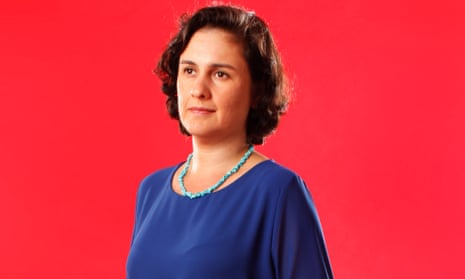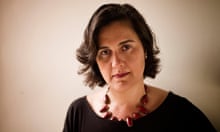Kamila Shamsie’s Home Fire, which reworks Sophocles’ tragedy Antigone to tell the story of a British Muslim family’s connection to Islamic State, has won the Women’s prize for fiction, acclaimed by judges as “the story of our times”.
The British Pakistani author’s seventh novel riffs on the ancient Greek play in which Antigone is forbidden to bury her brother Polynices after he is declared a traitor. The novel follows three orphaned siblings, elder sister Isma and twins Aneeka and Parvaiz, the latter of whom has left London to work for the media arm of Isis. When Eamonn, son of the British Muslim home secretary, enters their lives, Aneeka hopes to use him to save her missing brother.
Announcing Home Fire as winner of the £30,000 award, chair of judges Sarah Sands said the panel “chose the book which we felt spoke for our times … Home Fire is about identity, conflicting loyalties, love and politics. And it sustains mastery of its themes and its form. It is a remarkable book which we passionately recommend.”
Shamsie, who grew up in Karachi and now lives in London, beat a shortlist that included US author Jesmyn Ward’s novel Sing, Unburied, Sing, for which she won the National Book Award, and Imogen Hermes Gowar’s debut, The Mermaid and Mrs Hancock.
“It was a hard-argued choice, but it was unanimous,” said Sands, who is editor of BBC Radio 4’s Today programme. “It was extremely difficult, because of the richness and variety of the shortlist – imagine how you compare the experience of race in America versus courtesans and mermaids. But when we set out to decide what felt like the story of our times, [Home Fire] was the right choice.”
With Shamsie’s novel anticipating a British Muslim home secretary – since the novel was released, Sajid Javid was appointed to the role – Sands praised the novel’s “astonishing prescience” and “the breadth of its ambition”.
“Shamsie is funny and exact about the Muslim experience, what it means to be challenged on your identity, what it means choosing between public and private … Her nuance, her sympathies, really make you challenge your own lazy thinking on all this,” she said. “The different characters were all so well-realised that you have sympathy for all of them – even the brother, that was the extraordinary thing. There’s no question what he did was wrong, but you feel sympathy, that it was a terrible misjudgment, that there’s no going back.
“To humanise a political story in that way really does show what literature can do, that it can tackle a hard subject that otherwise would never have that sense of layered sympathy and understanding. It really advanced our understanding of the whole issue of identity.”
Home Fire, which was longlisted for the 2017 Man Booker prize and shortlisted for the Costa novel award, should also be considered “a really good page-turner”, said Sands.
“It is very readable, it’s extremely well written, it’s well plotted, it’s something that could easily be a brilliant television series or film. It’s not that you’re thinking, ‘This is a novel about politics, I need to plough through’,” she said. “It doesn’t feel as if she is straining to recreate Antigone – you could read it without thinking about Sophocles at all. In a way, that just gives it a resonance.”
Shamsie, who has been shortlisted for the Women’s prize twice before, is a vocal supporter of female authors. In 2015, she slammed the gender bias she saw in the books world and called for a dedicated year of publishing only women in order to redress the inequality. Pointing to the fact that just under 40% of novels submitted to the Man Booker prize in the five years before were by women, she praised the work done by the Women’s prize, which was established in 1996 after the Booker failed to shortlist a single woman. The award, wrote Shamsie three years ago, had helped to “create a space for women in a male-dominated world, giving voice and space to those who wouldn’t find them elsewhere”.
In a week when author Marian Keyes accused the Wodehouse prize for comic fiction of sexism, saying that “male voices are automatically given extra weight” when it comes to prize shortlists, Sands said that she felt the Women’s prize was still needed.
“I have absolutely loved immersing myself in women’s fiction for a year, it’s been an absolute privilege,” said Sands, who was joined on the judging panel – which considered almost 200 books – by the journalist Anita Anand, the comedian Katy Brand, the co-founder of the Women’s Equality party Catherine Mayer and the actor Imogen Stubbs.
The annual award, which has been won by authors including Lionel Shriver, Chimamanda Ngozi Adichie and Naomi Alderman in the last two decades, was previously known as the Orange prize and the Baileys prize.








